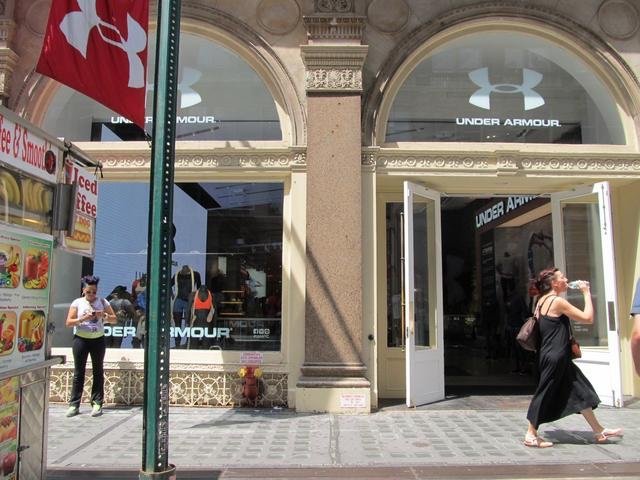NYC is not enforcing a law prohibiting stores from air conditioning the streets
July 27, 2023, 6 a.m.
Amid a global climate crisis, buildings are pumping AC onto the streets to lure customers inside.

Businesses that leave their doors open during summer are not getting fined.
It’s one of the more bizarre habits of city retailers, and one that city officials have inveighed against for years: businesses propping their doors open in the sweltering summer to pump air conditioning onto the city streets.
But not one New York City business has been fined for running air conditioning with open doors since 2019, according to an analysis of city data by Gothamist.
A 2015 law fines businesses that leave their doors or windows open while running their air conditioners, and repeat offenders can be fined as much as $1,000. The measure was passed amid increasing alarm over the city’s contributions to climate change — buildings account for roughly 70% of New York’s greenhouse gas emissions.
The last time the city issued a violation for spilling cold air outside was in October 2019, when it fined a Lindt chocolate shop in Midtown, according to a database of consumer affairs violations.
The city's Department of Consumer Affairs and Worker Protection, which is charged with enforcing the law, blames New Yorkers for not complaining enough.
“While the pandemic pause has been lifted, DCWP’s enforcement of the air conditioning law is complaint-based,” said Michael Lanza, a departmental spokesperson. “We urge anyone who observes businesses operating air conditioning with their doors or windows open, to contact 311.”
The department’s response baffled lawmakers.
“It's a law. It needs to be enforced, whether people are complaining about it or not,” said Councilmember Gale Brewer, who originally championed laws against blasting air conditioners on the street in 2008.
According to the Office of Technology and Innovation, 311 changed its coding of air conditioning law complaints in June 2019. Although complaints have tapered since the pandemic, they still come in.
“I think people probably don't know about the law,” Brewer said. “You still have to obey the law.”
“There needs to be a lot more education around this,” said Queens Borough President Donovan Richards, who sponsored the ban when he was a councilmember and chair of the Council Committee on Environmental Protection.
“I would hope that the Department of Environmental Protection along with the Department of Consumer Affairs would certainly do a lot more education because this is a waste of energy,” he said.
During the first year the law went into effect, the city received 350 complaints and issued 315 violations. Subsequent years averaged roughly 600 complaints a year until the pandemic, when complaints plummeted. In 2022, only 239 people filed complaints with 311.
On a recent sweaty evening in SoHo, dozens of shops and restaurants could be seen blasting pedestrians with cold air.
“Hmmm, it’s so nice, I love it,” Sarah Bonavich cooed. “Because when it's humid, like it has been for the last three weeks, it's really nice to walk by and have a little blast of cool.”
Shops owners say this sensation is intentional.
“We feel like the store is more inviting when the doors are open,” said Dee Myke, the owner of Sullivan Gallery Brought to You by Gods, a cannabis-related store on Sullivan Street.
Myke was unfazed about the energy used to cool the sidewalk.
“I don't feel like it’s a waste," he said. “If we're getting charged for it to be on, then if we don't have a problem being charged then it's not an issue.”
But greater building efficiency is one of the key elements of the city's plans to reduce carbon emissions.
“Blasting cool air onto the sidewalk is a significant waste of energy at a time when we need to be conserving it,” said Louise Yeung, chief climate officer at the city comptroller's office, which publishes a climate dashboard. “In order to meet our building emissions reduction goals, DCWP should enforce spaces that are increasing their greenhouse gas footprint by letting the cold air out.”
Worldwide, air conditioning accounts for 1,950 million tons of carbon dioxide a year, according to calculations made by Jason Woods, a research engineer for the National Renewable Energy Laboratory. This is about 4% of annual greenhouse gas emissions, about what the aviation industry emits.
“Leaving doors open while you're running the air conditioner will certainly lead to higher greenhouse gas emissions,” Woods said in an interview.
“The other way to think about this is, if we move to a more renewable energy grid, then maybe this isn't as big of a deal, right? But right now, we're still burning a lot of fossil fuels to make electricity. And so yes, it's a big contribution.”
The city’s open-door air conditioning law does not contain a citizen reward component, like the one passed in 2019 to crackdown on idling trucks. Lawmakers appear satisfied with that.
“It's not our intent to be so heavy-handed and to shut them down when they're struggling already and bouncing back from the pandemic,” Richards said.
“No, I don't think we need a bounty,” said Brewer. “I think agencies should enforce the law.”
Fact or fiction: Here’s what NY Gov. Kathy Hochul wants to do with gas stoves New York to apply tougher energy efficiency standards with new climate laws